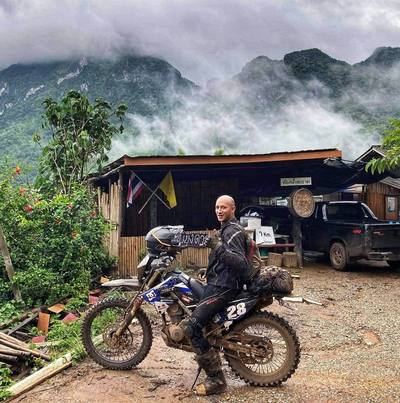Few things can compare to the freedom of riding a motorcycle while traversing Denver’s scenic roads.
However, unlike driving a car, you’re exposed to much greater risks since motorcycles lack the protections that passenger vehicles provide.
You’ll want to choose the right protective gear before you hit the open road on your motorcycle.
You should also be aware of your legal rights and know when to get legal help after a motorcycle accident in Denver.
What Protective Gear Should You Wear While Riding a Motorcycle?
When you get ready to ride, whether you’re commuting or taking a scenic ride for fun, you should always wear protective gear. It doesn’t matter how skilled you are at operating a motorcycle because the most common cause of motorcycle accidents is the careless actions of other motorists on the road. Here is a look at the gear you should have before you get on your motorcycle:
DOT-Approved Helmet
Helmets are not required by Colorado law for anyone 18 and over. They are only mandated for motorcycle operators or passengers under the age of 18. Even if you’re well above this age bracket, wearing a helmet provides extra protection for your head.
You never know when a condition on the road may cause you to fall off your motorcycle, or when another driver will crash into you. If you wear a helmet, you will have better protection from head injuries. Since traumatic brain injuries can have life-altering consequences, you should never ride without a helmet. Make sure that the helmet you use is U.S. DOT-approved as it will be crafted to meet the rigorous safety standards set by the federal government.

When choosing a helmet, it should be comfortable yet fit snugly. If it shifts or slides off your head, it’s too large. The chin strap should also fit well without pinching or cinching your neck. Shopping for a helmet that is DOT-approved ensures that you will not have obstructed peripheral vision while wearing it.
Eye Protection
Another requirement by the state of Colorado is that all motorcyclists and their passengers must wear eye protection.
Road debris and insects can quickly cause you to lose sight of the road ahead. You can wear goggles or glasses that are crafted from plastic or safety glass. Make sure that your goggles are worn outside of the helmet and that they stay firmly in place.
Protective Clothing
The clothing you wear can also help protect your body from the elements, debris, precipitation, and the road if you get in a motorcycle accident. Make sure you use full-finger gloves, wear boots that rise above your ankles, long pants, and a long-sleeved jacket. Ideally, these items should be crafted from durable materials.
The clothing you wear while riding adds an extra measure of protection if you get in a crash. It can also protect you from this traumatic event by making you more visible. Choose motorcycle gear in bright colors or with reflective materials, which will make you stand out to other drivers on the road.
What Happens If You Get into a Motorcycle Accident in Denver?
You could wear protective gear, follow all traffic laws, and even take a motorcycle safety course, but in the end, the negligence of other drivers may mean you get into a motorcycle accident. If another motorist caused the accident, you have the legal right to pursue compensation from the at-fault party.
It can be incredibly difficult to do on your own since insurance companies tend to blame motorcyclists for their injuries. If you weren’t wearing a helmet, they may claim that you wouldn’t have been hurt if you’d been wearing one. Even if you had a helmet on and followed all the rules of the road, they will look for ways to assign full or partial fault to reduce or deny your settlement claim.
For these reasons, it is essential that you know the steps to take after a motorcycle crash to protect your legal rights.
Call the Police to Report Your Motorcycle Accident
You may be in complete shock going from riding on the road to laying on it. The first step is to call 911 and have the police come to the scene. They will create an accident report that will detail their findings, and if they believe it was the other driver’s fault, they will state this in the report.
Get Immediate Medical Care
Motorcyclists who wear all the protective gear listed above might not always avoid injuries. While protective gear can certainly help to reduce the severity of injuries, it is best to have a full medical evaluation. Don’t assume you’re unharmed if you can get up and walk to the side of the road. You may have internal bleeding or a head injury that can become life-threatening when ignored.
Gather Evidence of the Crash
Use your smartphone to snap photos and record videos while the scene is still fresh. It may hold important clues that prove you were not at fault for the accident. If anyone saw what happened, make sure you get their contact information and a statement.
Hire Legal Representation at the Beginning of Your Claim
In Colorado, the at-fault laws for accidents mean that the driver who caused the accident is responsible for paying the damages. You may think it’s easy to see that the driver caused the accident, but the situation can get complicated and you might wind up being blamed because insurers are biased towards motorcyclists.
Before you contact the insurance company, contact a motorcycle accident attorney to communicate with the company on your behalf. They will investigate the crash, gather any evidence you were unable to get while you were receiving medical treatment, and negotiate for a fair settlement.
When you try to file a claim on your own, the insurer may use unnecessary delays and other delaying tactics. Before they can walk all over you, get the legal support you need to stand up to them.
ABOUT THE AUTHOR
Olivia Poglianich
Content Strategist
Olivia Poglianich is a nomadic brand strategist and copywriter in the motorcycling and adventure space who has worked with brands such as Visa, Disney and Grey Goose. Her writing has taken her all over the world, from a Serbian music festival to a Malaysian art and culture event. Olivia is a graduate of Cornell University and is often writing or reading about travel, hospitality, the start-up ecosystem or career coaching. Her latest interests are at the intersection of web3 and communal living, both on and offline.






